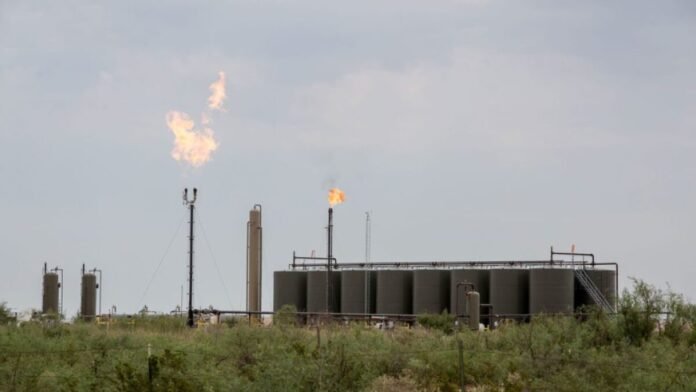New restrictions on oil and natural gas development on federal lands –imposed during the final days of the Obama administration – are harming the New Mexico economy and should be abolished, one of the state’s top business groups said today.
On a conference call with reporters, New Mexico Business Coalition (NMBC) president Carla Sonntag endorsed the use of the Congressional Review Act (CRA) to overturn the U.S. Bureau of Land Management’s “venting and flaring” rule.
The rule imposes new federal restrictions on top of existing state and federal regulations dealing with methane emissions from oil and natural gas wells.
There are 30,000 existing natural gas wells in northwest New Mexico and the venting and flaring rule threatens to shut down 70 percent of them, Sonntag said. The cost of compliance runs as high as $50,000 per well, she said.
“It doesn’t make economic sense and so the operators are now looking at shutting down these wells,” Sonntag said. “New Mexico can’t afford that.”
The state is struggling to overcome a series of budget deficits and revenue from oil and gas production is essential, she said. “One-third of our state’s budget is derived from the production of oil and natural gas. It’s also the single largest source of state funding for our public schools, our colleges, and it also covers our colleges, and it also covers healthcare.”
U.S. Rep. Rob Bishop (R-Utah), the chairman of the House Natural Resources Committee, plans to introduce a CRA disapproval motion on Monday.
Separately, another resolution disapproving of the Interior Department’s so-called stream protection rule will be introduced.
The rule threatens one-third of coal mining jobs in the country, according to the committee.
If supported by a majority of lawmakers in the House and the Senate and approved by President Donald Trump, a CRA disapproval motion can effectively repeal an agency regulation.
Bishop, U.S. Sen. John Barrasso (R) and other Western lawmakers have been leading the charge against the Obama administration’s BLM rules – which have targeted oil, natural gas and coal production on federal lands – as part of a broader regulatory reform push.
Critics of the BLM venting and flaring rule say it adds a needless new layer of federal bureaucracy on top of existing state regulations and industry programs that have already cut methane emissions from oil and gas development.
The U.S. Chamber of Commerce, for example, said this week the rule “effectively handcuffs the energy revolution by imposing unnecessary new controls and restrictions on oil and natural gas production.”
The BLM rule was issued last year by the Obama administration under pressure from “keep it in the ground” groups that oppose all production of oil, natural gas and coal.
The Center for Biological Diversity (CBD) and Sierra Club, for example, called the venting and flaring rule “a positive step” towards ending fossil-fuel production on federal lands completely.
As Western Wire reported this week, New Mexico Land Commissioner Aubrey Dunn (R) has harshly criticized Balderas for working with parties from outside the state to save the venting and flaring rule.
Dunn is worried oil and natural gas wells won’t be drilled because of the “cost of implementation and production limitations” tied to the rule. This could cut royalty revenues to the state by as much as 25 percent, he said.
Bishop, the committee chairman, said today the BLM rule is pursuing “ideological aims rather than responsible regulation” and ignores the work states have already done to limit emissions from oil and gas. “The states have not been idle,” he said.
In North Dakota, for example, flaring levels have fallen from 36 percent to roughly 10 percent under state-led regulation, “and they’re still working to drive that rate lower by 2020,” Western Energy Alliance President Kathleen Sgamma told reporters on today’s conference call. The Alliance is a supporter of Western Wire.
Such state-level regulations won’t be impacted by Congressional action to overturn the venting and flaring and stream protection rules, said Hal Quinn, president of the National Mining Association. “The CRA will not affect the states’ ability to adjust their state laws to address any real concerns,” Quinn told reporters.
Methane is the primary constituent of natural gas, a valuable commodity, so energy companies also have “every incentive to minimize venting and flaring of natural gas,” according to Dan Byers, senior director of policy for the Chamber’s Institute for 21st Century Energy. However, venting and flaring are necessary sometimes “either for safety purposes or due to a lack of sufficient infrastructure to transport the natural gas to market.”
“Rather than strengthen environmental practices, this command-and-control regulatory approach from Washington bureaucrats will simply chase energy developers away, ironically reducing royalty revenues in the process,” Byers wrote in a blog post yesterday. He added that venting and flaring is necessary in some areas because federal officials aren’t approving the pipelines needed to capture and transport the gas.
Energy companies “have no interest in losing any part of the natural gas they’re producing,” the NMBC’s Sonntag said today. “New Mexico needs these wells operating and it would be detrimental to our people to have them shut down.”

